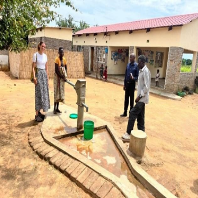march2018newsletter
Clean Beaches Project baseline study results
By: Joshua Veenstra, Maximillan Ziech, Faith Manda &Amons Longwe, URAC
Malawi experiences cholera outbreaks almost annually. Up to 800 cases of cholera have been reported in 2018 with some 25 deaths according to reports by the Epidemiology Unit of the Ministry released this month. Among areas most affected are lakeshore districts of Karonga and Nkhata Bay where open defecation is common. The main reasons for open defecation are sandy soils and lack of skills to build on such soils. The situation is worse for fishing villages on beaches. As a way to contribute to solving the challenge URAC is implementing a clean beaches project. To get the right ideas before actual project activities, a baseline study was conducted in January 2018 with a focus on both the migrant and original villagers. The study interviewed 48 people from purposively selected 10 beach villages from Tukombo to Mdyaka. The data which were captured and processed using the SPSS program revealed there is a serious need for intervention on issues of safe water and sanitation. Results of the Questionnaire for Original Villagers The original villagers whose living depends on fishing have problems to access safe water. The use of soap is as well a problem. Out of 48 villagers who were interviewed, 40 people have toilets, 8 persons do not have a toilet and 6 out of these 8, attributed their failing to have toilet to sandy soils which makes toilet construction a problem. Also, 4 interviewees use their neighbour’s toilet while the other 2 use the bush as their place of defecation and the remaining 2 said they bury in the sand. On water for washing plates/clothes, it was revealed that out of 48 interviewees, 33 use the lake, 3 use rivers, 2 use a tap or a kiosk, 11 use a borehole and the remaining 2 use wells as their water source. The revelation was also made on sources of water for bathing where 3 stated that they use the lake, 3 use the river, 12 use a borehole, 3 use a tap or a kiosk and 4 use a well as their main water sources. 33 out these 48 interviewees use a borehole as source of water for cooking while the other remaining use other sources like the lake. And lastly, 35 interviewees said that
they use a borehole for their drinking water while others use the lake. However, study also revealed that most of these people keep their drinking as well as cooking water in unsafe utensils like pails. Very few people use soap after changing babies’ nappies, before and after eating as most of them only use it for bathing and washing clothes or plates.
- That means that even people who possess a house don’t always have an own toilet.
- But in many villages, there is one communal toilet used by many residents.
The other important issue is that the study reveals that most of the people suffer from Malaria and diarrhea. 36 out of these 48 interviewees revealed that they at times have been sensitized on safe sanitation by various means like the media and Health Surveillance Assistants from the Hospital
Results of the Questionnaire for Migrant Fishermen After visiting many villages along the lakeshore for doing the baseline study we analyzed the collected data using SPSS. Out of the 10 sampled villages and 18 migrant fishermen were identified. All the 18 respondents indicated that they rely on fishing as their primary source of livelihood. However, 4 people mentioned that they also rely on business as a secondary means of finding money. Further the study revealed that although most of the migrant fishing community (84%) do have a house on the beach, only 50% own a toilet.
- That means that even people who possess a house don’t always have an own toilet.
- But in many villages, there is one communal toilet used by many residents.
- That means that even people who possess a house don’t always have an own toilet. · But in many villages, there is one communal toilet used by many residents.
The good thing is that all respondents (100%) accepted to contribute monthly money for supporting the project. The contributions ranged from MK200 to MK500 as the charts below illustrate.
This newsletter provides insights on urban & rural development issues in Malawi and what URAC does and plans to do to contribute to realization of SDGs through action research, advocacy, collaboration, and community capacity building in these thematic areas: water and sanitation, health, environment, housing, urban food security, disaster risk management, cross border interaction, livelihoods, local governance, land and resources tenure security, watershed and wetlands management. URAC thus creates a platform for voices of communities, researchers, students and practitioners to provoke action by policy and decision makers

